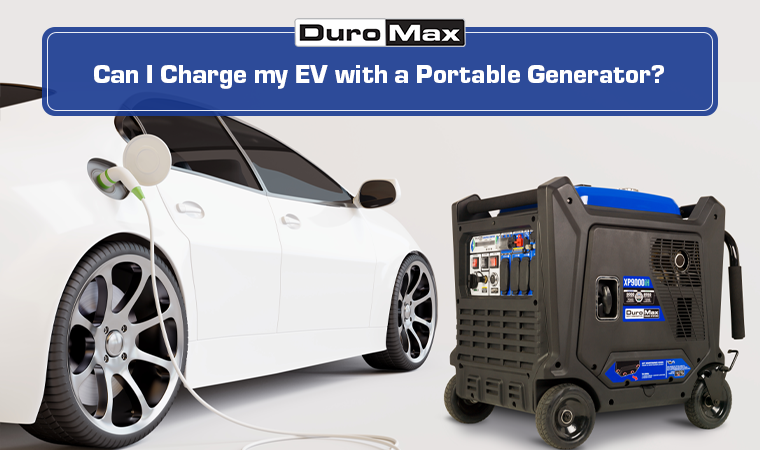Yes, you can charge an electric car with a generator. However, it’s not the most efficient method.
Charging an electric car requires a reliable power source, and while the grid is the most common solution, there are times when it might not be available. In these instances, a generator can serve as a backup option. Generators, typically running on gasoline, diesel, or propane, can provide the necessary electricity to charge an electric vehicle (EV).
This approach is particularly useful in remote locations, during power outages, or for those living off-grid. It’s crucial to ensure that the generator has the capacity to meet the electric car’s charging requirements. Utilizing a generator for EV charging is a practical solution under specific circumstances, offering flexibility and peace of mind to electric car owners.
The Feasibility Of Charging An Electric Car With A Generator
Imagine you’re on a road trip. Your electric vehicle (EV) needs a charge. No charging stations are nearby. A generator could be the answer. But can you really charge your EV with one? Let’s explore this possibility.
Types Of Generators Suitable For Ev Charging
Not all generators are fit for the job. Your choice matters for a safe charge.
- Inverter Generators: These are quiet and efficient. They provide clean energy, similar to what your EV expects from the grid.
- Portable Generators: They’re mobile and can be useful in remote locations. But, they must have the right power output.
- Standby Generators: These are powerful and can handle the load. But they’re not for travel – they stay at home.
Technical Considerations For Connecting A Generator
Charging an EV with a generator isn’t plug-and-play. You need to consider several technical points.
- Power Output: Your generator must match or exceed your EV’s charging requirements.
- Connector Compatibility: The generator’s outlet must fit your EV’s charging cable.
- Power Quality: EVs need stable power. Ensure the generator can provide this.
- Safety Features: Look for generators with built-in protections against overloading and surges.
| Generator Type | Power Output | Suitable for EV? |
|---|---|---|
| Inverter Generator | High | Yes |
| Portable Generator | Medium to High | Depends on Model |
| Standby Generator | High | Yes, at Home |
Using a generator to charge your EV is possible. Choose the right type and mind the technical details. Your EV can get its needed power, even off the grid.

Credit: m.youtube.com
Calculating Power Requirements For Ev Charging
Charging an electric vehicle (EV) with a generator requires understanding the power needs of your car and the output capacity of the generator. In this section, we’ll explore how to calculate the compatibility between your EV’s charging requirements and a generator’s output. This ensures efficient and safe charging away from fixed charging stations.
Understanding Your Electric Vehicle’s Charging Needs
Each EV has a specific charging profile, which dictates the power it can accept. To find your car’s requirements, check the manual or a label near the charging port. It will list the kilowatt (kW) rate the car can handle. Note these details:
- Battery capacity in kilowatt-hours (kWh)
- Maximum charging power acceptance
- Required charging time for a full charge
Use this formula to estimate charging time:
Charging Time (hours) = Battery Capacity (kWh) / Charging Power (kW)
Matching Generator Output With Ev Input
Generators vary in output, measured in watts or kilowatts. To match with your EV:
- Identify the generator’s maximum output.
- Compare it to your EV’s charging power acceptance.
- Ensure the generator can deliver the required power consistently.
A stable and sufficient power supply is critical for safe EV charging. Consider these generator features:
| Feature | Importance |
|---|---|
| Continuous Power Rating | Indicates long-term output capacity |
| Inverter Technology | Provides clean energy for sensitive electronics |
Choose a generator with an output that exceeds your EV’s needs to ensure adequate charging without overloading the generator.
Pros And Cons Of Using A Generator For Ev Charging
Electric vehicles (EVs) offer a cleaner way to travel. Yet, charging options may be limited. Generators can charge EVs, but this comes with pros and cons.
Benefits Of Portable Power Supply
Generators offer backup power. This is useful during outages. Portable generators make EV charging possible anywhere. This is vital in remote areas.
- Travel flexibility: With a generator, EV owners can venture beyond public charging spots.
- Emergency readiness: In power outages, a generator can be a lifeline for EV charging.
- Off-grid capability: For off-grid living, generators can enable EV use.
Challenges And Limitations Of Generator Charging
While generators offer solutions, they also have drawbacks. It’s important to weigh these before using one for EV charging.
- Fuel costs: Generators need fuel. This can be costly and may offset some EV savings.
- Lower efficiency: Charging an EV with a generator is less efficient than using the grid.
- Noisy operation: Generators can be loud, which may be a nuisance.
- Emissions: Gasoline or diesel generators produce emissions, which reduces the environmental benefits of EVs.
Compatibility issues may arise. Not all generators can handle the load of an EV charger.
Wear and tear on the generator is another factor. Heavy use for EV charging can lead to more maintenance.

Credit: www.evconnect.com
Step-by-step Guide To Charging An Ev With A Generator
Electric Vehicles (EVs) are the future of transportation. Yet, charging them can sometimes be a challenge, especially in areas without easy access to charging stations. A solution? Using a generator. This Step-by-Step Guide shows how to charge an EV with a generator safely and effectively.
Safety First: Precautions To Take
Before connecting your EV to a generator, safety is key. Follow these steps:
- Read the generator’s manual. Know its limits.
- Use a generator with enough power. Your EV’s manual can tell you how much you need.
- Keep the generator outside. Generators make carbon monoxide, which is dangerous inside.
- Check for fuel. Make sure the generator has enough.
- Plug in the generator. Use a heavy-duty, outdoor-rated extension cord.
Connecting Your Ev To The Generator
Now, let’s connect your EV to the generator. Follow these steps:
- Turn off your EV and the generator. Safety first!
- Connect the extension cord to the generator.
- Plug the other end of the cord into your EV’s charger.
- Start the generator. Wait a few moments.
- Turn on your EV’s charging system. Check the manual if unsure how.
Your EV should now be charging. Remember, charging this way may be slower than at a charging station. Always keep an eye on both your EV and the generator while charging.
Generator Types: Inverter Vs. Conventional
Electric cars need charging, just like your phone. But what if you’re far from a charging station? Can a generator help? Let’s explore two types of generators: inverter and conventional.
Comparing Inverter And Conventional Generators For Ev Use
Generators make electricity. But not all do it the same way. Here’s why:
- Inverter generators are quiet and efficient. They adjust their speed based on what’s needed. This saves fuel.
- Conventional generators run at a constant speed. They don’t care if you need a little or a lot of power. This can waste fuel.
Inverter generators are like smart phones. Conventional ones are like old landline phones.
Why Inverter Generators Are A Preferred Choice For Many Ev Owners
Why do many electric car owners pick inverter generators? Here are three big reasons:
- Less noise: Inverter generators are much quieter. This means less noise in nature or at camping sites.
- Better for the car: They give cleaner power. This is safer for your car’s battery.
- More fuel-efficient: They use less gas. This saves money and is better for the planet.
Inverter generators are friends to both your wallet and the environment.
Environmental Impact Of Charging Evs With Generators
Many electric vehicle (EV) owners consider using generators for charging. Understanding the environmental impact is crucial.
Emissions Considerations
Generators run on fossil fuels. They release carbon dioxide when used. This is important for eco-conscious EV owners.
- Portable generators are common but not always clean.
- Diesel generators can emit high levels of pollutants.
- Even gasoline models contribute to greenhouse gases.
Comparing Carbon Footprint To Traditional Charging Methods
Let’s compare generator charging with grid charging.
| Charging Method | Carbon Footprint |
|---|---|
| Generator Charging | Higher due to direct emissions |
| Grid Charging | Varies with energy mix |
Renewable energy sources make grid charging cleaner. Generators often have a larger carbon footprint.
Case Studies: Real-world Examples Of Ev Charging With Generators
Electric vehicles (EVs) are the future of transportation. Yet, charging can be a challenge. Generators present a solution. They can charge EVs when traditional power sources are not available. This section explores real-world examples. We look at successes and lessons learned from using generators to charge EVs.
Success Stories Of Ev Owners Using Generators
Many EV owners have found generators to be life-savers. Let’s dive into some success stories.
- Emergency Power: In power outages, generators keep EVs running. One owner used a portable generator to charge their EV during a blackout. They kept their daily routine uninterrupted.
- Rural Living: Another owner lives off-grid. They use a generator to charge their EV. It’s their primary source of power. This setup proves reliable and efficient.
- Compatibility Check: One user learned to check generator output first. Their generator was not compatible with their EV. This mismatch can cause damage.
- Safe Operation: Another learned the importance of ventilation. They ran a generator in a closed space. This caused safety hazards. Always use generators outdoors.
Lessons Learned From Generator Charging Mishaps
Not all attempts to charge EVs with generators go smoothly. Some lead to valuable lessons.

Credit: www.duromaxpower.com
Future Of Ev Charging: Innovations And Alternatives
The electric vehicle (EV) revolution is changing how we think about fuel. Innovations are making charging faster and more convenient. Drivers look for alternatives beyond traditional charging stations. Let’s explore the future of EV charging, focusing on new technologies and the role of generators.
Emerging Technologies In Ev Charging
- Wireless charging – Park and charge without cables.
- Solar-powered stations – Use the sun to power up.
- Battery swapping – Exchange empty batteries for full ones.
- High-capacity chargers – Spend less time plugged in.
The Role Of Generators In The Future Ev Landscape
Generators could be a bridge to the future. They might charge EVs when other sources are not available. This can be during outages or in remote areas. Clean generators, like those running on biodiesel or hydrogen, align with green goals.
| Type of Generator | Potential Uses |
|---|---|
| Portable Generators | Emergency charging, travel |
| Permanent Generators | Backup for charging stations |
| Renewable Generators | Eco-friendly power on the go |
Frequently Asked Questions
Can Generators Charge Electric Cars Effectively?
Yes, generators can effectively charge electric cars, but it’s essential to use a properly rated generator and consider the charging time.
Is Using A Generator To Charge Evs Cost-efficient?
Charging an EV with a generator may not be cost-efficient due to fuel expenses and lower charging efficiency compared to grid power.
What Generator Size Is Needed For Ev Charging?
A generator with a capacity of at least 4 kW is recommended to charge an electric car without overloading the generator.
Are Portable Generators Suitable For Ev Charging?
Portable generators can charge electric cars in emergency situations, but they are not intended for regular EV charging due to their lower power output.
How Does Generator Charging Impact Ev Battery Life?
Frequent charging with a generator may lead to inconsistent power supply, which could potentially reduce the overall lifespan of an EV battery.
Conclusion
Charging an electric car with a generator is indeed possible, but it’s essential to consider efficiency and practicality. Opt for the right generator size and understand the trade-offs involved. Embrace this flexibility while prioritizing sustainable charging options for a greener future on the road.





